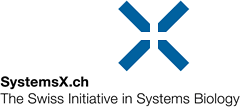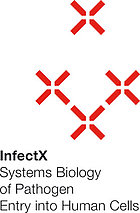InfectX
Systems Biology of Pathogen Entry into Human Cells
This project aims to identify the cellular components relevant for the entry of a pathogen into human host cells and then to design mathematical and computer-assisted models of the signaling pathways that control pathogen entry as a basis to identify novel targets for anti-infectives.
To date, the strategy to fight infectious diseases has focused mainly on targeting unique processes or enzymes of pathogens with specific drugs to eradicate the causative pathogen. The major advantage of this approach is the minimal toxic side effects to the host due to evolutionary divergence between host and pathogen. The most notable examples of this approach are antibiotics and anti-viral drugs.
Identification of novel drug targets
However, despite tremendous success of these drugs in modern medicine, a serious disadvantage of this pathogen-directed strategy has been the rapid development of bacterial and viral drug resistance mechanisms. This has become an increasingly serious problem, requiring the development of more effective anti-infectives based on the identification of novel drug targets that can be used against resistant or mutated microbial and viral pathogens.
Controlling pathogen entry into the human cell
The aim of this project is to:
- comprehensively identify the components of the human infectome for a set of important bacterial and viral pathogens;
- develop new mathematical and computational methods that enable the reconstruction of key signaling pathways that control pathogen entry into human cells;
- provide a novel drug target for an innovative host-directed anti-infective strategy.
| Principal Investigator | Prof. Christoph Dehio, Biozentrum, University of Basel |
| Involved Institutions | University of Basel, ETH Zurich, University of Zurich |
| Number of Research Groups | 11 |
| Project Duration | Jan. 2010 - Dec. 2013 |
| Approved SystemsX.ch Funds | CHF 5.139 million |
Updated September 2012


